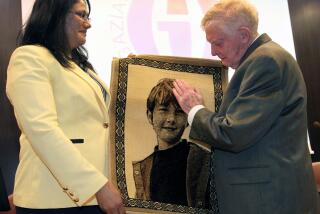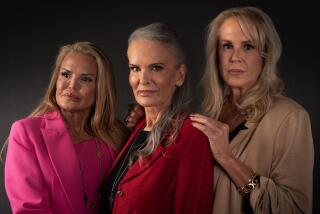Parents of Son Slain in Italy Find Solace
- Share via
BODEGA BAY, Calif. — Maggie and Reg Green’s daughter was born swiftly, leaving them no time even to get to the hospital. At 6, she is determined and competitive, and she plays to win. But their son, their first-born, took “ages and ages” to arrive, as his father puts it, and they often wondered if his easy temperament was due to his slow, unhurried birth.
“Nicholas never cared whether he won or not,” says Reg Green, sitting in the living room of their Bodega Bay house.
“Which is good, because Nicholas wasn’t very lucky--things like rolling the dice or hitting the right cards,” says Maggie Green quietly.
What remains unspoken is the worst piece of luck to befall their son. One night on an Italian highway, bandits fired into the car carrying the Green family on vacation and shot 7-year-old Nicholas, sleeping in the back seat. He lingered in a coma in an Italian hospital and died two days later.
When his parents decided to donate his vital organs to Italians in need, the Greens’ private loss became an internationally heralded good deed. It moved Italy to strike a gold medal in their honor and caught the attention of the world media.
Now, 16 months later, Maggie Green is five months’ pregnant with twins--a boy and a girl--conceived through in vitro fertilization. She and her husband can only guess at the personalities and arrival times of their unborn. But they will be born to parents who each day cope with a horrible loss while finding solace in raising their daughter and expanding their family.
Reg Green remembers looking at his son in his hospital bed. “I knew when I saw Nicholas that night, if he died, I could never be happy again,” Green says. “And I still feel that way. I don’t think these babies will change that. I feel an optimism about life, but everything has a sad tinge about it.”
*
Since the tragedy, the Greens’ life has both returned to its normal pace and taken on a new public dimension. Reg Green is proud of the fact that in the wake of his son’s death he never missed putting out an issue of the twice-monthly mutual fund newsletter that he writes.
On the other hand, their actions in Italy gave them a fame and reputation that continues. The Greens have become symbols of a drive to encourage organ donation, giving speeches and interviews around the world.
After a speech in Dallas last year, a member of the Donor Awareness Coalition effused in a letter to the Greens: “You folks have probably done more to promote organ and tissue donation than any other person or organization.”
They have been inundated with gifts of all kind from Italians: cards and letters, jars of marmalade, poems written to Nicholas, portraits of him--even a sculpted bust--and a piano sonata dedicated to the boy. Reg Green meticulously writes back, working late into the night. Their recent Christmas card list is a dog-eared 15 pages crammed with names.
And a big part of returning their life to normal included having more children. Their daughter, Eleanor, who still talks about her brother, is so pleased that she announced the pregnancy in her classroom. “We don’t want her to think of herself as the sister of the lost brother,” Reg Green says. “But on the other hand, we don’t want her to forget him.”
Green’s friends were a bit surprised. He is 67. His wife is 34--the same age as his son from a previous marriage. (He also has a 32-year-old daughter.)
“All Maggie’s friends have been supportive,” Green says. “All my friends laugh uproariously--’At your age! You should know better!’ ”
The couple met in the Virginia suburbs of Washington in the early ‘80s when their sailing club put them on the same boat on Chesapeake Bay one day. “I always thought that she liked the masterly way I handled that craft,” he says, laughing. “It was only later that she told me I looked so helpless she felt a need to look after me.”
They will have been married 10 years in April. They share a house with a spectacular view across Bodega Bay to an outcropping of rock where sea lions bask.
There is no denying that losing Nicholas was a big part of why they tried again. “In some ways Nicholas will be replaced,” muses Maggie Green. “The sense of noise in the house, more people around the dining room table.”
But she is stunned when people ask her if she will name one of her twins Nicholas. “Which is an amazing question,” she says, “because we already have a son named Nicholas.”
Their son’s ill-fated trip began about 10:30 p.m. on Sept. 29, 1994, when the Greens headed out in a modest rental car from Paestum through Calabria to Sicily. Seasoned travelers, they spent most summers in Europe. The Greens figured they would make the eight-hour drive to Palermo in the night while the children slept.
The highway’s reputation for crime didn’t worry them. Trucks were regularly hijacked for their merchandise but the drivers were rarely harmed, and “it was totally unknown for a small car to be attacked,” Reg Green says.
When another car pulled up alongside them, the occupants shouted incomprehensibly at the Greens and shot at them, blowing out the side windows. Reg Green outdistanced the assailants, “and we more or less congratulated ourselves on getting away,” he recalled.
The Greens already were discussing something as mundane as their car insurance when they pulled over to the side of the road and discovered that their son had been shot in the head.
He never regained consciousness. (According to the Greens, two people are on trial in Italy.)
As the couple watched their son slip away over his two-day stay in the hospital, they made what seemed to them an unremarkable decision to donate his organs. “There he was apparently in perfect health--untouched except for this small wound in the back of his head,” Maggie Green says. She has opted to be an organ donor (and so has her husband), but it was never anything the two discussed.
“It was such a natural thing to do,” Reg Green says.
*
They donated Nicholas’ heart, kidneys, liver, the cells from his pancreas, and both corneas. They since have met the seven recipients--and dozens of other Italians who from the time of the shooting reached out to comfort the Green family. The Italians have brought the family back to Italy several times for honors and speeches.
The Greens spent the first anniversary of Nicholas’ death in Calabria. “Certainly when we were leaving Sicily just after Nicholas died it would have been hard to imagine going back,” Maggie Green says, “but in those first days, in those months that followed, the Italians did so much and said so much to help us.
“To be surrounded by people who were remembering Nicholas was a great support. He’s given his name to schools, parks and playgrounds, so there’s a sense that he has a legacy there.”
In Bodega Bay, life goes on, but always Nicholas is there. Hand-me-down clothes for the expected babies are coming back to Maggie from friends and family--and she can tell that some of them once belonged to Nicholas.
At Nicholas’ nearby grave, Reg Green pulls off the road at the wooden gate to a snippet of a cemetery tucked into a hillside. Nicholas’ grave is toward the top, marked by a marble headstone.
Behind it sit plastic gallon bottles of water for tending the grass in drier weather. On the grave are colorful trinkets left by well-wishers--toys and bells and even a couple of lucky dice.
“They blow off but I find them,” Green says.
He quietly surveys the scene in the rain then walks down the hill and heads home.



